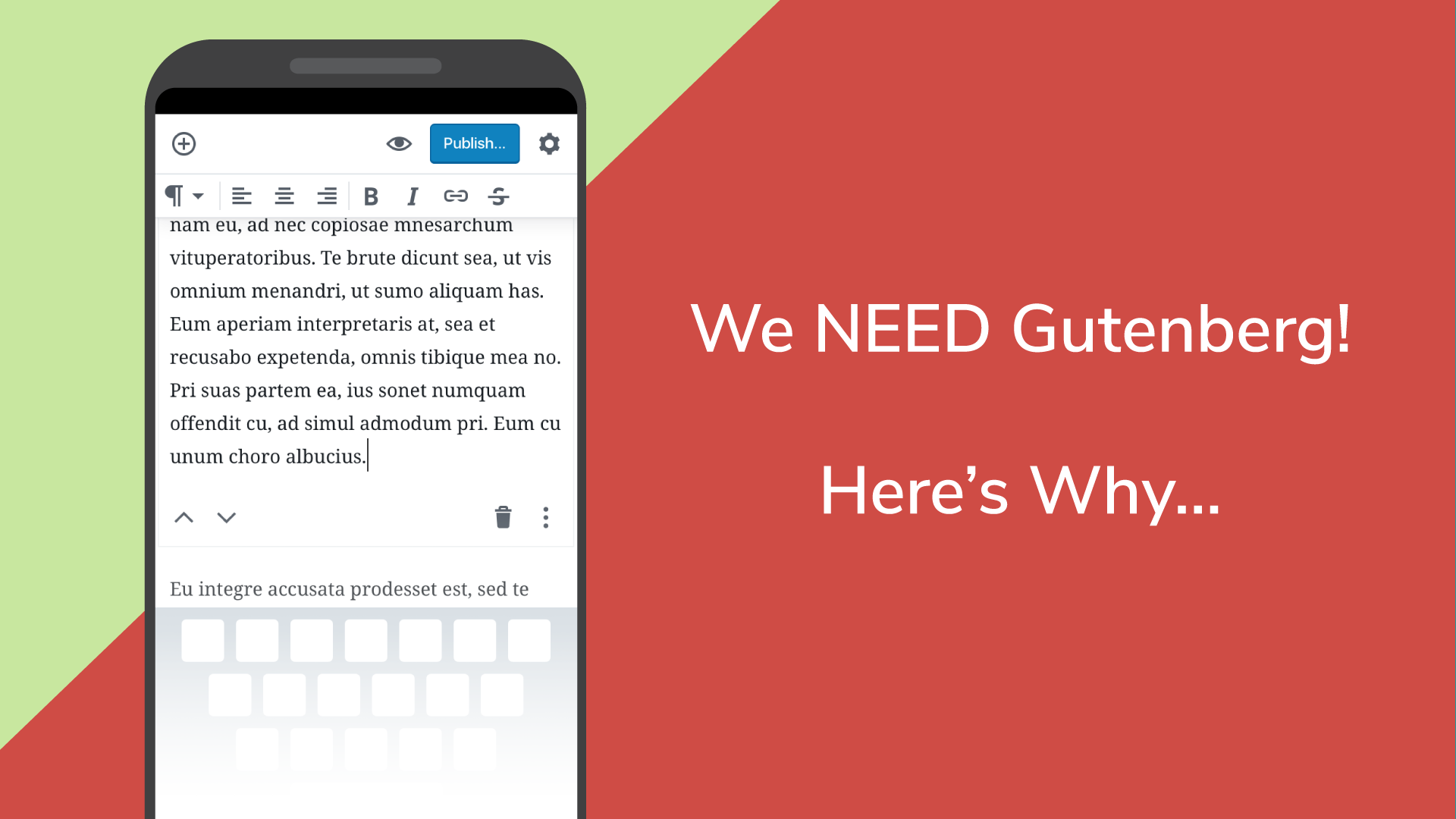I recently presented on the new Gutenberg editor for WordPress that will launch with WP 5.0. I gave the presentation at two local meetups. I inadvertently volunteered myself by suggesting we have someone present on Gutenberg. Since I knew more about it than anyone else, I ended up with the job. I wanted to explain to people why Gutenberg was important. But I didn’t know why. I researched a bunch and came up with what I think is the real answer.
After the presentations, I made a screencast of my presentations. You can watch it here, with the transcript below. If you prefer reading, I recommend my guest post on the WP Tavern. It’s more polished than the transcript below. You can also learn more about the response to my post on the Tavern and WP Weekly podcast.
Hi, my name is Tevya Washburn and I am a WordPress guy. I’ve been presenting a couple of the local meetups here about Gutenberg and explaining at least in the intro, explaining “why?” “Why is Gutenberg so important?” And I haven’t heard anybody saying this. You might know this guy named Simon Sinek. He’s been featured on Ted and a bunch of other places and he talks about how people tend to tell about the “what” and the “how” and that’s how we want to present things when we’re familiar with them. But what people who aren’t familiar with, and really want to know, is they want to know the “why.” They want to know why we’re doing this? “Why?” What’s the reasoning behind the product that we have to offer the service we have to offer? And so I’ve noticed that most people are not looking at Gutenberg from the perspective of the “why.”
They’re looking at what it is. And some people have problems with that, or they’re looking at how it’s executed, and some people have problems with that too. I’m not saying those aren’t legitimate, but it seems to be presented from the wrong angle. This isn’t meant to be a criticism of those people who are against Gutenberg and it’s not meant to be a criticism of those people who are for Gutenberg, but maybe haven’t done the best job of presenting the “why.”
I just wanted to present this perspective because I thought it was unique and hopefully it will be helpful to people. So what my goal here is to do is to explore the “why” of Gutenberg. Why is it important to us, why are we doing it right now? And I think that Matt Mullenweg and some people have kind of alluded to some of this stuff, but nobody, as far as I have seen, has explained it really well. That’s what I’m hoping to do for you today. So you might have heard of a book called The Innovator’s Dilemma In it, Mr. Clayton Christensen presents this idea of what’s called “innovative disruption.” That’s where a new technology is invented by innovators and it comes in and disrupts the old.
So a really great example that I love is Blockbuster versus Netflix, and we can also put Redbox in there with Netflix, but I’m just going to talk about Netflix in order to keep it simple. So let’s see what Clayton said about it, he said “A disruptive innovation is… a product [or] service that is unattractive to the established leaders in an industry,” and we find that’s what happens with Blockbuster. They were the big players in town. Their market share was are off the charts… it was bigger than anything before. They had all these video stores and you could go in and rent a VHS and later at DVD for a few bucks, it was convenient and people considered it convenient, stuff like that. They were on top of the world and so they had no reason to innovate.
But along comes this little company called Netflix and they start innovating and what did they do? First of all, the very first thing they do is they said “we could fit DVD in an envelope. Why can’t we just ship them to people?” Blockbuster’s sitting there going, “why would anybody want to wait two weeks? They can just walk into our store and get one right now and then go home and watch it.” But Netflix said “we think people will change the way they think when they want to get a movie. They’ll think ahead about their movies, they will order in advance, and then it arrives in the mail and it’s just way simpler and easy for them to do.” So that’s what Netflix started doing. A little ways into it when they started to get off the ground and they actually had the idea of streaming video along with it. But again, at the time Internet didn’t really have the bandwidth to handle streaming video. And so again, Blockbuster… everything’s good for them. Why would they change? Why would they want to innovate or disrupt their own business model with all this crazy new stuff when everything’s going good and they have all this market share and all this revenue and stuff?
Well, they actually got a chance to buy Netflix and I want to say, don’t, quote me on this, but I want to say it was for like $5 million or something like that (NOTE: it was actually $50 million). Whatever it was, it was pocket change at the time, I mean pocket change for blockbuster. They could have easily done it and now it would have proven to be the greatest investment of all time, quite possibly, if they had actually bought Netflix out at that point. So as we all know, Netflix started to gain market share. People started changing their habits. They started ordering their movies well in advance and getting them in the mail. Blockbuster just continued… kind of doing the same-old same-old. Maybe dabbled with a few things or whatever, but Netflix really started gaining some ground and then broadband Internet really started to take off and people could watch movies online instantly. They don’t have to walk into a store, they don’t have to wait two weeks. Of course, as you know, that’s when Netflix really started to take off in their market share. They just exploded, went way beyond what Blockbuster had before, and Blockbuster began to tank, they began tank very, very quickly. So they did what they call in this model “too little too late,” which is where they try to do some things and those things don’t really work because it’s too little too late. They’re not the innovators and they’re left behind. So this is what’s called “the innovator’s dilemma.”
Now, before I go on, I just want to say that these charts are not accurate. I didn’t pull in a bunch of data or anything like that. They’re just meant to represent this concept and hopefully I can explain this innovator’s dilemma concept in a way that’s helpful to you and that you will be able to benefit from. And the thing that is true for a lot of this that I’m going to be talking about today: It is not intended to be, you know, entirely accurate, but just to illustrate some points.
So this model is really cool because we can see it in a lot of different things. It doesn’t just apply to business. For example, I got a degree in history when I was in college, and so this is something that really excites me, a model that I can look at. If you look at power or you know, who controls things and who runs the show with monarchies, in the past. There was a time when monarchies were the thing. Everybody, you know, especially in the western world, everybody had a king and that’s how things went. But what was happening throughout the renaissance and things that followed was that people were becoming more and more literate. They are learning to read. Along with that, democracy began to rise. People got these ideas that, “hey, those people in power, they’re not so special.” Initially when the monarchs and such, the church even could control literacy and things like that, like they were the only ones who are literate. They were the only ones who are well educated. Then it was easy for them to control things.
As time went on, people got smarter and smarter and as we know that Gutenberg printing press was one of those key turning points in literacy. Once books can be reproduced and newspapers and all this stuff could be reproduced on a mass scale and much more quickly than many, many, many more people have access to books and were able to learn how to read. So literacy rises and we start to see democracy arise along with it. So as time goes on, obviously that catches on as people are more educated, they don’t want to listen to one person telling them what to do and so we have this rise of democracy, and representative democracies, and things like that, and the downfall of monarchies to the point where western world monarchies are almost non-existent. That’s what we’ve seen happen. So it follows that same pattern that we saw with Blockbuster and Netflix. And so it’s very interesting thing with Blockbuster… I think most of us, because we’re techies, we would cheer Netflix on right? They’re the good guys. They’re the underdogs, that in that case, we wanted to win. In this case, we cheer on literacy and democracy. That’s what we want to see.
Unfortunately in the WordPress world, we’re that platform. Everybody is using WordPress and most people that want to see WordPress succeed, that it is the one on top right now. We’re the ones with the innovator’s dilemma right now. We’re the ones who have to decide what we’re going to do? The axis says “power” right here, but really it should really say it’s “market share.” With like 30 percent of all websites being built on WordPress. We have a huge amount of market share and momentum on our side. But guess what? We just saw it on those two other examples: it doesn’t take a lot, except what it takes is really innovative new idea. A really innovative new execution of an idea can tople it all. It will fall literally, just overnight. And we can go from being, you know, 30 percent of the web to within a year or two or three to being, almost zero percent of the web. Do we really want that?
I think that’s what makes WordPress so attractive is that there are so many other people out there using it. There’s this huge, huge community and it’s really, really awesome and almost anytime you want to do something you can go find a plugin that somebody’s already built that does that thing that you want to do. And that’s because the community is so big and it’s open and all those things, right? But if it tumbles and suddenly the community, or at least most of it, goes away overnight and there’s not so many plugins being created and there’s not so much cool stuff going on, then suddenly WordPress isn’t a very attractive platform and we’re going to have to change. We’re going to have to adapt and learn something new. So I think what’s going on is that the leaders like Matt Mullenweg and some of these other brilliant developers who are behind the Gutenberg project are looking ahead and they’re saying “there’s only one way to combat this. There’s only one way for us to stay on top.”
And that’s the lesson of the innovator’s dilemma: that the top dog, the one with all the market share, the one with all the power has to innovate. They have to disrupt themselves. They literally have to go and say, “how can we change our fundamental business model in order to innovate and be better going forward to the point that we might not recognize it anymore? Like we have to change the core of who the businesses is, or what the business is, to the point that it might not be recognizable in a few years down the road.” But that’s the only way to stay on top. That’s the only thing Blockbuster could have done other than buying Netflix out: they could have innovated themselves. They could’ve come up with those ideas and started exploring streaming online videos, or different things like that, and disrupted their own business model so that when things changed, they were the ones making the changes instead of the other way around.
A great example of this, while we’re looking at this chart is Intel sometime back when AMD was the new kids on the block. They showed up and the CEO of Intel called up Clayton Christensen that I quoted from earlier and said, “what can you do for me? What does your book or your thesis mean for my company?” So Clayton said, “well, I can’t tell you what it means for your company, but I will tell you how it works. I’ll tell you how my model works and you can apply it to your company.” So he explained kind of the same stuff that I’ve been explaining to you to the CEO of Intel. Well, what Intel did, was they came out with their Celeron processors, the very next year. Those Celeron processors competed with AMD’s much cheaper options and kept Intel on top. And so Intel was able to innovate and disrupt the market themselves and compete with the innovators and stay on top, and that’s what we are hoping for WordPress.
I think that’s what we’re seeing. Gutenberg is right here, or we’ll launch, you know, in the near future. This first green Arrow is right here and Gutenberg it’s going to launch here in the near future. And hopefully what we see is that is the innovation that WordPress needs. Gutenberg is the innovation that is needed for us to change WordPress in a fundamental way. So that it can be innovative and it can compete with whoever’s down here trying to innovate and disrupt the WordPress market share. So if it is the right innovation, and I personally tend to think that it is, then what we’re going to see is WordPress is gonna change and it’s going to be changed in a fundamental way and it’s going to be very, very different in just a few years, then what it is right now. But that’s a good thing because what that means is that it can take new market share, it can go to new heights instead of becoming irrelevant and getting disrupted by whoever or whatever technologies are down here.
So hopefully that all makes sense. In a podcast on WordPress Weekly, Matt Mullenweg quoted this guy, Eric Shinseki. I think that’s how you say it. And what his quote was, “If you don’t like change, you’ll like irrelevance even less.” And I think that’s what Gutenberg is all about. So all these people are resisting it because there’s change. And I’m not gonna deny that man there is! It is a big, big change and there’s going to be a lot of pain involved. Like people are already complaining about all these different things they’re going to have to change, and how all these plugins are going to have to be made compatible with Gutenberg, and all these things you know, all this stuff that has to be done, and we have to learn new things, and we have to teach our clients new ways to interact with WordPress and to build pages and all that kind of stuff; because Gutenberg is such a big change and eventually Gutenberg is going to take over the entire WordPress admin interface. It’s going to completely change everything. So that seems like this huge, huge painful change. But like a Mr. Shinseki is saying, “man! If you think this change sucks, well, how’s it going to be if we’re irrelevant?”
If in five years nobody wants a WordPress website anymore, then we’re going to have to do even more change to learn a new platform anyway. So we might as well get behind Gutenberg and support it as the right change for WordPress right now, that will allow it to innovate, and allow it to compete in the future, and allow it to maintain its market share; than to resist it and fight back and tell everything that’s wrong with it and resist the change. Because if that route is followed, then we’re just going to be irrelevant. We’re going to have to learn a new whole new platform anyway because WordPress is going to be irrelevant. Nobody’s going to be using it anymore. Something else is going to have 30 percent or 50 percent of the market share on the web. And so that’s really the crux of what it all comes down to. What I think people haven’t been doing very good job of explaining about Gutenberg is the “why.” And Gutenberg is named that because the Gutenberg printing press changed everything as far as literacy and democracy and the education in the world goes.
Now I will say, lastly, that you can argue that the Gutenberg is not the right innovation, that it’s not going to save WordPress because it’s the wrong kind of innovation and I think that’s totally valid argument. That’s something you can make a stand on. Nitpicking over how it works, or how difficult it’s going to be to change, or all that kind of stuff… those are invalid arguments. Hopefully I’ve shown that today, but what is a valid argument is that maybe it’s the wrong kind of change. Maybe it’s not the thing that we need to keep WordPress relevant? That’s totally a valid argument. You can make that.
I don’t personally think that that is correct. I think that the way that WordPress became so popular in the first place was that it was relatively easy to set up and use. It has gotten more complicated over time and it’s not the most easy option to use out there right now. A lot of people have complained like, well, we don’t want to compete with medium and with Squarespace and all this stuff, and it seems like Matt Mullenweg is focused on that. My response to that is, “yes we do.” We have to compete with those things because that’s what made WordPress so popular in the first place and that’s the only way to move forward, in my mind. Again, this is my argument. This is what I think a lot of other people who are pro-Gutenberg are also arguing: that Gutenberg is the right innovation to disrupt WordPress. It’s going to disrupt itself and become something new down the road. I agree with that argument and I tend to think that it is the right way and that’s why people got on to WordPress.
That’s why I personally got involved with WordPress. I kept updating stuff through Dreamweaver, and FrontPage, and all this stuff, where I’d have to update it and then update all the files across the whole website and then upload with FTP. There’s all this big old massive pain. Then I found out WordPress. You can install it very quickly. Even back when I started using it in 2009, some hosts already had one-click installers for WordPress, so I could install a website really quickly. And when I updated the design, it updated it site-wide. I didn’t have to go in and tweak it on every page, and every post, and everything like that. It managed everything for me and it was so much easier to use than Drupal or Joomla or any of those other ones that I tried out to see if they would work for me. It was just way, way, way easier. It’s way friendlier. It’s gotten more and more complicated overtime. It’s gotten more difficult to use. So Gutenberg is the correct innovation. In my mind, it’s the right one because it’s going to make it so much easier to use. Once again, I think that Gutenberg is definitely the way forward because of that. Because of how easy it will make it to use, at least for the more common things that people do.
Hopefully this has helped you understand the why of Gutenberg, why I think it’s so important. I hope it helps change the debate around Gutenberg because people can look at the wife first and not just what’s going on or how it’s being executed, but the underlying why that’s the most important part of all this. Thank you.





0 Comments